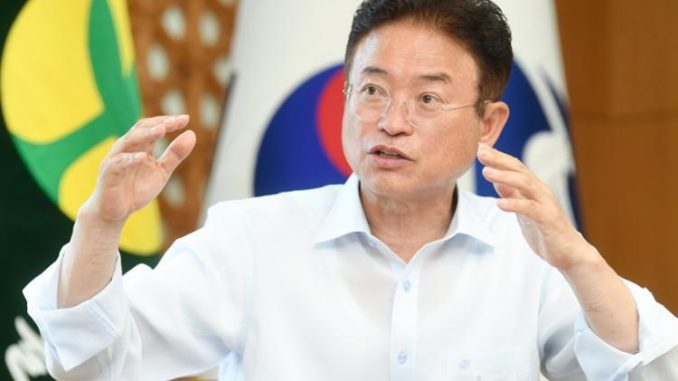
North Gyeongsang Province Governor Lee Cheol-woo / Korea Times photo by Jung Gwang-jin
Governor plans to strengthen provincial competitiveness through metaverse
By Jung Da-hyun
As society evolves rapidly with advanced technologies, North Gyeongsang Province is strategically focusing on positioning itself as a central hub of the metaverse – a hypothetical iteration of the internet forming a singular, immersive virtual world ― seeking to boost the competitive edge of the local government.
“Centralization in metropolitan areas is a significant issue in Korea. We believe the metaverse will present a promising opportunity for our growth,” North Gyeongsang Province Governor Lee Cheol-woo said in a recent written interview with The Korea Times.
In line with this vision, North Gyeongsang Province unveiled a master plan last October to establish the province as a pioneer in leveraging the metaverse within Korea. The plan aims to respond to the trend of centralization in metropolitan areas, while cultivating the province into a leading metaverse-centric region.
The province highlights its abundance of innovative resources related to the metaverse. Gyeongbuk Technopark, for instance, is at the forefront of driving local industries and fostering innovation within the province.
It also boasts key regional industries in innovative technologies, including electronic information and communication in the western region, mobility manufacturing in the southern region, steel in the eastern region and bio in the northern region.
Recently, it was designated as a national high-tech strategic industry-specialized complex for semiconductors and secondary batteries.

North Gyeongsang Province Governor Lee Cheol-woo presents a digital transformation plan for the province alongside his onscreen AI avatar at North Gyeongsang Provincial Government office, May 5. Courtesy of North Gyeongsang Provincial Government
Lee envisions that integrating the metaverse with these key innovative industries will propel North Gyeongsang Province forward.
Additionally, the province plans to blend the metaverse with its rich cultural heritage. North Gyeongsang Province possesses six out of Korea’s 16 UNESCO World Heritage sites, making it the region with the highest concentration of such sites.
Examples of these cultural treasures include Andong Hahoe Folk Village, Bulguk Temple in Gyeongju and Seokguram Grotto – a remnant of Buddhism from Silla, a Korean kingdom that existed between 57 BCE and 935 CE.
“Technically integrating the metaverse with the cultural heritage of North Gyeongsang Province can nurture a high value-added industry,” Lee said.

North Gyeongsang Province Governor Lee Cheol-woo, center, attends the local government’s executive meeting, which introduced a metaverse system, wearing AR glasses, Aug. 29. Courtesy of North Gyeongsang Provincial Government
The province has recently taken steps to introduce the metaverse in real life.
On Aug. 29, it introduced a metaverse system based on mixed reality (MR) during a provincial government executive meeting. This innovative system aims to revolutionize meeting cultures through its telepresence function – a video conferencing system combining virtual reality and internet technology to create an immersive experience.
With this system, document-free meetings are feasible. Significantly reducing administrative costs such as travel expenses is also possible. And it enhances accessibility, allowing participation in meetings anytime and anywhere with specific glasses and mobile devices.
“The sense of togetherness while using this technology is remarkable. I anticipate its utilization to surpass other video-based meetings,” he said.
He also plans to actively implement this technology not only in general executive meetings but also in smaller working-level meetings and director-general sessions.
Furthermore, the governor recognizes agriculture as an industry that can achieve significant synergy through the integration of innovative technologies. By introducing the metaverse to agriculture, the province aims to bolster the competitiveness of its agricultural sector.
Leveraging these advanced technologies in agriculture enables the simulation of maximum production, incorporating aspects such as environmental and pest control by selecting crops suitable for specific soil conditions in a virtual space.
Moreover, it facilitates better predictions and responses to environmental changes, including weather variations, by connecting to actual farms.
“We will enhance the regional competitiveness of the province by integrating the metaverse into various specialized areas within the region, countering the increasing concentration in metropolitan areas,” Lee said.


